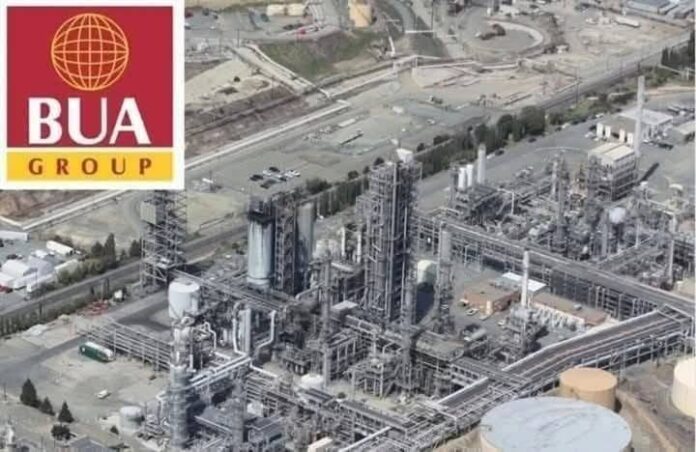The management of BUA Refinery and Petrochemicals has quashed rumors suggesting that its highly anticipated Akwa Ibom refinery project has reached 90% completion. In a statement released to address public confusion, BUA urged Nigerians to rely only on official channels for updates, emphasizing that while construction is progressing as planned, claims of 90% completion are false.
“Contrary to a misleading report stating that our 200,000 barrels per day refinery is at 90% completion, BUA wishes to advise the public to disregard such reports that did not emanate from us,” the company stated. The refinery, a cornerstone of BUA’s ambitious industrial vision, represents a significant step in bolstering Nigeria’s energy independence.
Construction Progresses, Not Completion
Located in Akwa Ibom State, the 200,000-barrel-per-day facility is part of Nigeria’s efforts to reduce reliance on fuel imports and improve refining capacity. The project aligns with the federal government’s drive to stimulate local manufacturing, reduce unemployment, and strengthen the country’s energy infrastructure.
While BUA acknowledges substantial progress, it stopped short of specifying an exact completion percentage. “We are proud to share that construction is progressing steadily. Whilst the refinery is not at 90% completion, we are on track to meet our delivery timelines in collaboration with our partners,” the statement read.
Energy Security in Focus
The Akwa Ibom refinery isn’t the only initiative BUA has in its energy portfolio. According to the company, plans are underway for a mini-liquefied natural gas (LNG) plant and additional hybrid power plants across Nigeria. These projects aim to boost the company’s already formidable power generation capacity, which exceeds 1,000 megawatts.
“These energy projects are pivotal for Nigeria’s industrial development,” said a senior industry analyst. “It reflects BUA’s commitment to not just refining oil but also driving broader energy sustainability.”
Setting Standards in Transparency
BUA emphasized its long-standing commitment to transparency in project delivery. Over the past decade, the conglomerate has executed more than 12 large-scale projects worth over $3.5 billion. These achievements span multiple sectors, including manufacturing and power generation.
“As we have consistently done with our completed mega industrial projects, we will continue to provide accurate updates only where necessary and as milestones are achieved,” the company stated.
The statement also highlighted BUA’s pivotal role in Nigeria’s industrial landscape, which has seen the company contributing significantly to local development through investments in cement, sugar, and now energy.
Avoiding the Pitfalls of Fake News
The refinery controversy underscores the importance of verifying information in an era of widespread misinformation. BUA advised Nigerians to cross-check news through its official channels to avoid being misled by “mischievous persons.”
A public relations expert described the incident as “a reminder that even credible projects can become victims of misinformation in the age of social media. Corporations must proactively engage to correct such narratives.”
Public Enthusiasm Meets Industrial Ambition
Public interest in the Akwa Ibom refinery project remains high. Many Nigerians see the initiative as a potential game-changer for the country’s economy, given its promise of job creation, increased refining capacity, and reduced dependence on fuel imports.
However, achieving such transformational goals requires not just speed but also meticulous planning. The road ahead for BUA involves coordinating with both local and international partners to ensure delivery within projected timelines.
“As we work together to build a stronger industrial and manufacturing base for a self-reliant Nigeria, we appreciate the public’s interest and enthusiasm for this transformative project,” BUA said in its closing statement.
Nigeria, despite being Africa’s largest oil producer, still imports most of its refined petroleum due to inadequate refining capacity. This has put a strain on foreign exchange reserves and made the country vulnerable to global oil price volatility.
The Akwa Ibom refinery, alongside other private-sector-led initiatives, is expected to bridge this gap. Yet, experts caution that timely completion and transparent reporting will be crucial for building public trust and securing long-term benefits for Nigerians.
For now, BUA remains one of the leading players championing the country’s industrial renaissance. The public will be closely watching its next move as it inches closer to completing what could become one of Nigeria’s largest refining facilities.

